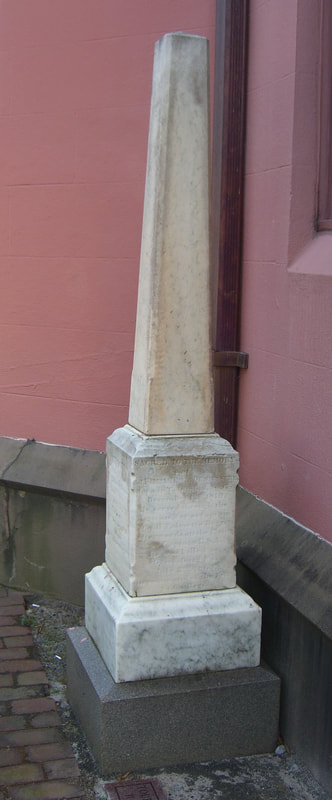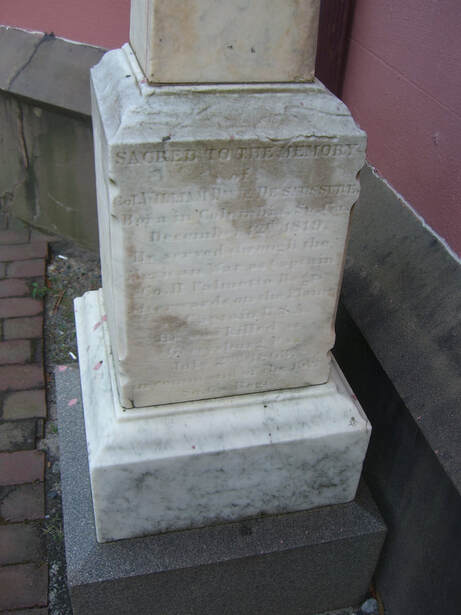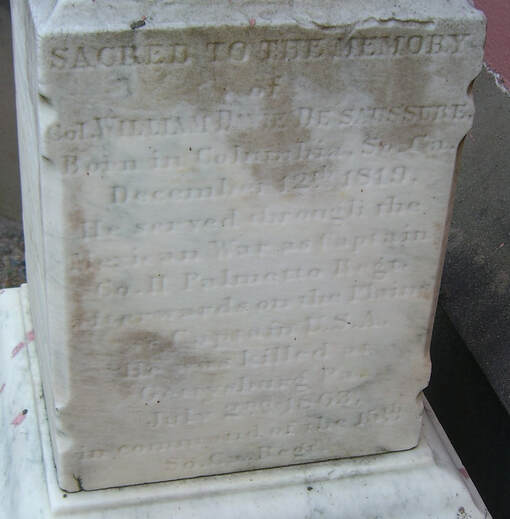The Battle of Gettysburg: Stories of Fatal Encounters
William Davie DeSaussure,
15th South Carolina Infantry
Killed July 2, 1863
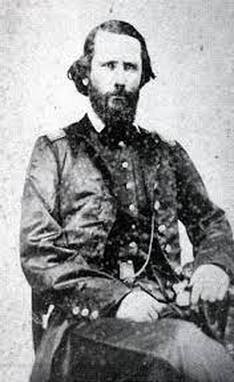 Colonel William Davie DeSaussure
Colonel William Davie DeSaussure
Colonel William DeSaussure and the 15th South Carolina Infantry were part of Joseph Kershaw's South Carolina Brigade. On July 2nd, Kershaw's Brigade would leave Seminary Ridge and attack Northern Troops positioned near the famous Rose Woods and Wheatfield. During this advance DeSaussure would be killed instantly by a gunshot to the chest. Joseph Kershaw his brigade commander would later comment that DeSaussure was several paces in front of his line with sword drawn when struck.
The Charleston Daily Courier on 18 September, 1863 would write of DeSaussure, "He finally met the soldier's fate at Gettysburg, in Pennsylvania, in July of this year, in the way described by Gen. Kershaw and other officers-thus putting to seal to a life of hard, patriotic and distinguished service, by a death of honor which his comrades and command and the State itself will never cease to deplore."
Captain Richard O'Neale served in the 15th South Carolina Infantry. He would tell his story published in the "State" (Columbia, South Carolina) newspaper 16 March, 1930. "The day before the battle of Gettysburg I was talking with Colonel DeSaussure. He appeared rather sad and morose that day. 'Captain,' he said to me, tomorrow I am going to lose my life.'" 'A hard charge and desperate fight confronts us, and we all feel that way; I answered. 'It is probable that many of us will be lying dead on the field before another day has passed.'
"As we charged down Seminary ridge in an open field, Colonel DeSaussure fell with a bullet through his heart. Lying near him was another of our best officers and over to one side a young-boy he was of such a tender age that he looked like a girl-lay dead.
DeSaussure's loss was a heavy one. The forty-three year-old Colonel had served in the Mexican War and had been an officer in the Regular Army until he resigned his captaincy in the First Cavalry in 1861. Some called him the "Bayard of South Carolina." There were those who believed that this small-statured man with a stentorian voice had military talents on a par with Kershaw's. This comparison was great praise, and his talent would be sorely missed.
p 336 Dickert "Kershaw's Brigade."
The Charleston Daily Courier on 18 September, 1863 would write of DeSaussure, "He finally met the soldier's fate at Gettysburg, in Pennsylvania, in July of this year, in the way described by Gen. Kershaw and other officers-thus putting to seal to a life of hard, patriotic and distinguished service, by a death of honor which his comrades and command and the State itself will never cease to deplore."
Captain Richard O'Neale served in the 15th South Carolina Infantry. He would tell his story published in the "State" (Columbia, South Carolina) newspaper 16 March, 1930. "The day before the battle of Gettysburg I was talking with Colonel DeSaussure. He appeared rather sad and morose that day. 'Captain,' he said to me, tomorrow I am going to lose my life.'" 'A hard charge and desperate fight confronts us, and we all feel that way; I answered. 'It is probable that many of us will be lying dead on the field before another day has passed.'
"As we charged down Seminary ridge in an open field, Colonel DeSaussure fell with a bullet through his heart. Lying near him was another of our best officers and over to one side a young-boy he was of such a tender age that he looked like a girl-lay dead.
DeSaussure's loss was a heavy one. The forty-three year-old Colonel had served in the Mexican War and had been an officer in the Regular Army until he resigned his captaincy in the First Cavalry in 1861. Some called him the "Bayard of South Carolina." There were those who believed that this small-statured man with a stentorian voice had military talents on a par with Kershaw's. This comparison was great praise, and his talent would be sorely missed.
p 336 Dickert "Kershaw's Brigade."
After his death on July 2, the body of DeSaussure would initially be buried near the Frances Bream Farm in the old McClellan Cemetery.
There is discussion that DeSaussure's remains were later sent to Richmond's, Hollywood Cemetery, before being sent to Columbia. Through Bob Gale's research he concludes two important facts.
1. His family was prominent and probably had the means to recover him.
2. His name does not appear in the Hollywood Cemetery register of Confederate burials. Even if DeSausser was in Hollywood and removed to Columbia, it would mention it. He is not listed in the register.
Perhaps further research is required.
There is discussion that DeSaussure's remains were later sent to Richmond's, Hollywood Cemetery, before being sent to Columbia. Through Bob Gale's research he concludes two important facts.
1. His family was prominent and probably had the means to recover him.
2. His name does not appear in the Hollywood Cemetery register of Confederate burials. Even if DeSausser was in Hollywood and removed to Columbia, it would mention it. He is not listed in the register.
Perhaps further research is required.
DeSaussure final resting place is located in the First Presbyterian Churchyard Columbia, Richard County, South Carolina. Photographs courtesy of Bob Gale.
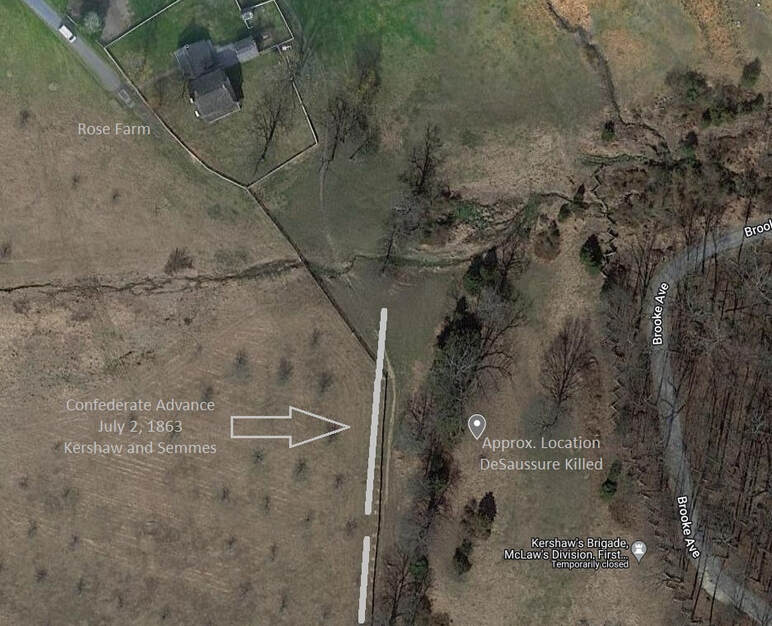 July 2, 1863 Colonel William DeSaussure is killed leading the 15th South Carolina Infantry.
July 2, 1863 Colonel William DeSaussure is killed leading the 15th South Carolina Infantry.
General Kershaw described DeSaussure's death in a letter to the colonel's father in Columbia: "Your son fell at the head of his regiment, leading it in the fearful charge of his brigade. The ball pierced his heart and I am sure he felt no pain. He fell forward on his right side. His drawn sword lay extended just beyond his extended arm. The light of battle was still in his eye, and a firm compression of his lips indicated heroism of this heart at the moment of death."
Edward Clarkson DeSaussure's orderly would write: "we lost our Colonel, one of the finest men that ever lived. The regiment loved him and many of them shed tears when they heard he was dead. He has been kind to me as a father could have been ever since I have been his orderly."
On August 5, 1863, General Kershaw found time to write to DeSaussure's father explaining the circumstances of their son's burial at Gettysburg: "There was no possibility of removing the body, as we had not transportation of the wounded, and I presume there is no way of effecting it now. If there be any, it can only be through our exchange commissioner at Richmond. To me and to his noble regiment his death is an irreparable loss. A senior Colonel of my command I always felt that the honor and safety of his brigade in which my heart is so bound up was secure in his hands should I be removed. All their hopes are perished with him. We can only mourn his untimely fall and look to others to fill his place and emulate his virtues. Private Burroughs has a lock of his hair which I preserved, which with other articles he awaits an opportunity of sending home. May God mercifully temper his great affliction to you and his stricken family.
Edward Clarkson DeSaussure's orderly would write: "we lost our Colonel, one of the finest men that ever lived. The regiment loved him and many of them shed tears when they heard he was dead. He has been kind to me as a father could have been ever since I have been his orderly."
On August 5, 1863, General Kershaw found time to write to DeSaussure's father explaining the circumstances of their son's burial at Gettysburg: "There was no possibility of removing the body, as we had not transportation of the wounded, and I presume there is no way of effecting it now. If there be any, it can only be through our exchange commissioner at Richmond. To me and to his noble regiment his death is an irreparable loss. A senior Colonel of my command I always felt that the honor and safety of his brigade in which my heart is so bound up was secure in his hands should I be removed. All their hopes are perished with him. We can only mourn his untimely fall and look to others to fill his place and emulate his virtues. Private Burroughs has a lock of his hair which I preserved, which with other articles he awaits an opportunity of sending home. May God mercifully temper his great affliction to you and his stricken family.
Following the battle, Colonel DeSauaaure's remains were buried in McClelland Cemetery just north of Black Horse Tavern. This cemetery can be found along Blackhorse Tavern Road just north of the farm.
See Gregory A. Coco's incredible book "A Vast Sea of Misery." This publication contains details in regards to the Black Horse Tavern as a Confederate Field Hospital as well as other field hospitals that surrounded Gettysburg.
